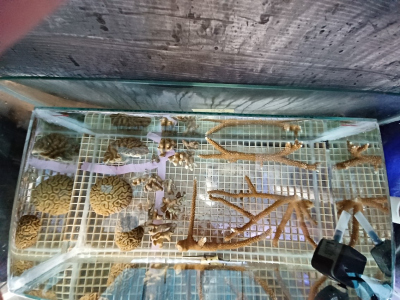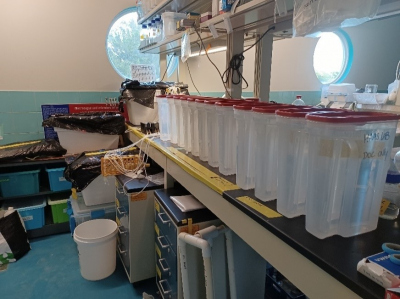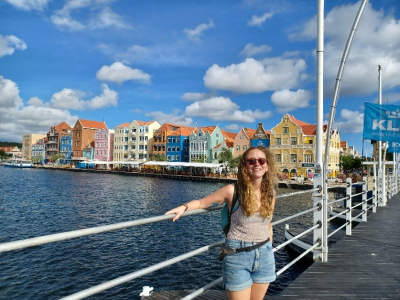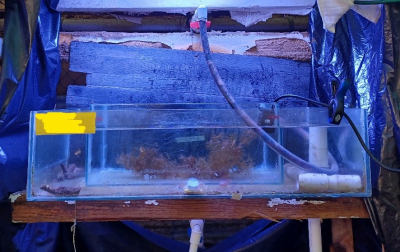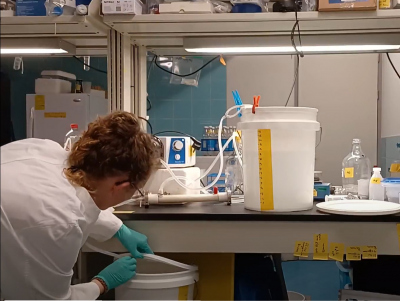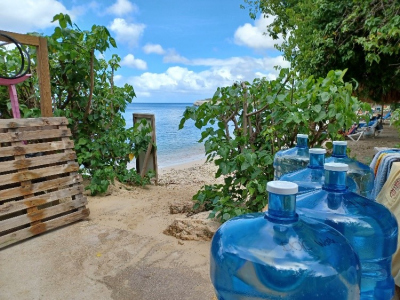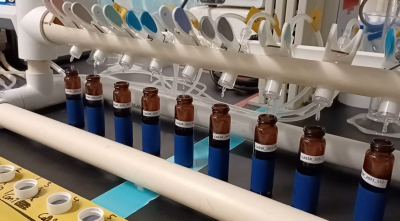- Graduate School GLOMAR
- PhD student reports
- Field Campaigns
- Bianca Thobor
Bianca Thobor
Report of GLOMAR PhD student Bianca Thobor about her field campaign on Curaçao in the Dutch Caribbean from 26 October to 7 December 2021
I started my PhD in February 2021 and went on my first field campaign in October, after months of working in home office due to the global pandemic. When the time came to plan the field trip, it was hard to deal with the uncertainty of possible travel restrictions. However, in the end I only needed proof of vaccination and a negative PCR test to get to the island, and once there, everyone had to get tested again on the third day. From there on there were few restrictions due to the low spread rate on the island.
Overall, my PhD in the department for Marine Ecology at the University of Bremen deals with effects of eutrophication on coral reefs. For the Caribbean, eutrophication and loss of herbivores in the past decades have led to degradation of reefs and increased abundance of macroalgae. That is why my project on Curaçao aimed to find out how exudates released by corals and algae differently affect the bacterioplankton community.
I conducted my research on Curaçao at the Caribbean Research and Management of Biodiversity foundation (CARMABI), a research station located right at the beach with direct access to a reef, as well as a wet-laboratory for aquaria experiments, and a dry laboratory for sample processing. Two members of my GLOMAR thesis committee, Dr. Andreas Haas from the Royal Netherlands Institute for Sea Research (NIOZ), and Dr. Benjamin Müller from the University of Amsterdam, were present during the field campaign and helped me to implement my experiments.
During the first two weeks of my stay, I got to know the facilities, got introduced to different methods, and organized the setup of my experiment. This part took longer than expected, but I had some buffer in my time schedule. Next to planning and getting to know everyone at the research station, I was able to explore the island and surrounding reefs during my free time. In the third week, I could start the first part of my experiment. This included collecting corals and macroalgae from the reef, and incubating them in an aquarium. Afterwards, I filtered and concentrated the water. Because filtration and concentration took so long, I could only do one incubation a day, meaning a full two weeks of incubations with long waiting times spent cleaning equipment. When I was done with all incubations, the exciting part started. I wanted to feed the concentrated exudates to a microbial community form the reef. For this, I first had to collect 70 Liters of seawater and distribute it into my experimental chambers. Then, I added the exudates of corals, algae, and controls, and incubated these chambers in the dark for a total of four days. I collected samples at several timepoints, which sometimes meant working at night and sleeping in between sampling periods. At the end of the six weeks, I had finished everything and headed back home with two suitcases full of samples, as well as Christmas presents from the Caribbean.
Back in Bremen, I am now working on analyzing my samples with the help of the Marine Glycobiology group of Jan-Hendrik Hehemann at the Max Planck Institute for Marine Microbiology. My next trip will take me to NIOZ, located on Texel in the Netherlands. There, I will do a research placement in the working group of Dr. Andreas Haas, and analyze my microbiological samples.
I want to thank Dr. Andreas Haas, Dr. Benjamin Müller, and also Milou Arts and Lisa Schellenberg for their support and advice during my time on Curaçao, as well as afterwards. I also want to thank the other two members of my thesis committee, Dr. Christian Wild and Dr. Jan-Hendrik Hehemann, for their support and advice during the whole process of this project. Additionally, I want to thank Dr. Nicola Steinke, Dr. Silvia Vidal Melgosa, Tina Trautmann, and Alek Bolte for their advice and support in analyzing the sugar composition of my samples.
